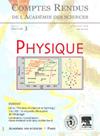用对准和曲率张量分析离散位错数据
IF 1.2
4区 物理与天体物理
Q3 ASTRONOMY & ASTROPHYSICS
引用次数: 4
摘要
分析大规模离散位错数据需要用合适的平均量来表征复杂位错网络。在目前的工作中,我们提出了位错对准张量和密切相关的曲率张量作为位错分布的几何和拓扑特征的易于提取和可理解的度量。我们提供了从基于直线段的离散位错数据中提取这些度量的公式。给出了解释和可视化这些措施的例子,用于一个简单的配置和两个更复杂的离散位错模拟结果。我们建议在塑性研究中更广泛地使用取向张量和曲率张量。本文章由计算机程序翻译,如有差异,请以英文原文为准。
Analysing discrete dislocation data using alignment and curvature tensors
Analysis of large scale discrete dislocation data requires the characterisation of complex dislocation networks by suitable average quantities. In the current work, we suggest dislocation alignment tensors and closely related curvature tensors as easily extractable and intelligible measures of geometrical and topological characteristics of dislocation distributions. We provide formulae for extracting these measures from discrete dislocation data based on straight segments. Examples for interpreting and visualising these measures are provided for a simple configuration and two more involved results from discrete dislocation simulations. We suggest the alignment and curvature tensors for wider use in plasticity research.
求助全文
通过发布文献求助,成功后即可免费获取论文全文。
去求助
来源期刊

Comptes Rendus Physique
物理-天文与天体物理
CiteScore
2.80
自引率
0.00%
发文量
13
审稿时长
17.2 weeks
期刊介绍:
The Comptes Rendus - Physique are an open acess and peer-reviewed electronic scientific journal publishing original research article. It is one of seven journals published by the Académie des sciences.
Its objective is to enable researchers to quickly share their work with the international scientific community.
The Comptes Rendus - Physique also publish journal articles, thematic issues and articles on the history of the Académie des sciences and its current scientific activity.
From 2020 onwards, the journal''s policy is based on a diamond open access model: no fees are charged to authors to publish or to readers to access articles. Thus, articles are accessible immediately, free of charge and permanently after publication.
The Comptes Rendus - Physique (8 issues per year) cover all fields of physics and astrophysics and propose dossiers. Thanks to this formula, readers of physics and astrophysics will find, in each issue, the presentation of a subject in particularly rapid development. The authors are chosen from among the most active researchers in the field and each file is coordinated by a guest editor, ensuring that the most recent and significant results are taken into account. In order to preserve the historical purpose of the Comptes Rendus, these issues also leave room for the usual notes and clarifications. The articles are written mainly in English.
 求助内容:
求助内容: 应助结果提醒方式:
应助结果提醒方式:


